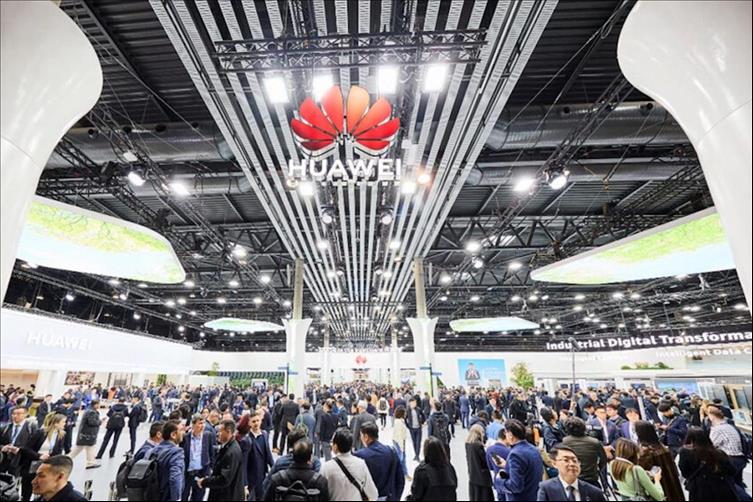
Beijing: With Huawei Curbs, US Pushes 'Decoupling'
The United States revoked some export licenses that permitted the shipment of high-end American chips to Huawei, and Beijing complains that Washington thus breached a commitment not to try to decouple the two economies.
The US Commerce Department told the Financial Times on Tuesday that it had revoked certain export licenses related to the shipment of American semiconductors to Huawei.
Citing people familiar with the situation, the report said the latest restriction affects the supply of chips for Huawei's laptop computers and mobile phones.
The new US chip ban came after Huawei on April 11 unveiled its first artificial intelligence-enabled laptop, MateBook X Pro, powered by Intel's new Core Ultra 9 processor.
Republican lawmakers criticized the Biden administration for allowing this to happen and called for revoking all the export licenses for the chip shipment to Huawei.
Intel said in a stock exchange filing on Wednesday that its sales will be negatively affected by this measure. It said the company expects revenue for the second quarter of 2024 to remain in the original range of US$12.5 billion to US$13.5 billion, but below the midpoint. It added that its revenue and earnings per share are expected to grow year-on-year for the full year of 2024.
Qualcomm said Wednesday that one of its export licenses for Huawei had been revoked.

Nothing preposterous about our Foreign Legion story

Could Biden stop Netanyahu's attack on Rafah?

US, China in crucial race to put spying eyes in the sky
“The US actions have significantly breached the commitment of not seeking to decouple from China and not hindering China's development,” a spokesperson for the Chinese Commerce Ministry said in a statement on Wednesday, adding that these actions are also“in stark contrast to the US claim of precisely defining national security.”
“The US restrictions on exporting purely civilian consumer chip products to China and the implementation of a supply cut-off to a specific Chinese company represent a clear case of economic coercion,” the spokesperson said.“This approach not only contravenes World Trade Organization rules but also severely harms the interests of US companies.”
Since Chinese President Xi Jinping met with US President Joe Biden in San Francisco last November, Beijing has kept reminding Washington to uphold its promise of“not seeking to decouple from China and not hindering China's development.”
But the US Commerce Department in late March revised its chip export rules to make it harder for China to obtain US artificial intelligence (AI) chips and chip-making equipment.
On April 2, Xi told Biden in a phone call that the China-US relationship is beginning to stabilize but some negative factors have also been growing. He said this requires attention from both sides.
Huawei's market shareBack in 2019, the Trump administration placed Huawei on a trade restriction list for violating Iran sanctions.
The Shenzhen-based company was banned from using Google's Android operating system and Qualcomm's 5G chips but it could still obtain Qualcomm's 4G processors.
In November 2020, Huawei spun off its smartphone sub-brand Honor in order to allow the unit to continue to get US high-end chips.
After Huawei launched the Mate 60 smartphone using its self-developed Kirin 9000s processor last August, a group of 10 Republican lawmakers called on the Commerce Department's Bureau of Industry and Security (BIS) to deny all export items for Huawei, Semiconductor Manufacturing International Corp (SMIC) and their units including Honor.
US Commerce Secretary Gina Raimondo said last October that reports of Huawei's chip breakthrough were“incredibly disturbing.” She said her department would add new tools and increase resources to enforce its export-control regime against Huawei.
Huawei No. 1 againMeanwhile, Canalys, a Singapore-based technology market analyst firm, said in a research report on April 26 that Huawei regained the status of No.1 smartphone maker in mainland China in the first quarter of this year after 13 quarters of weak performance.

Sign up for one of our free newsletters
- The Daily ReportStart your day right with Asia Times' top stories
- AT Weekly ReportA weekly roundup of Asia Times' most-read stories
It said Huawei's smartphone shipment in the country grew 70% to 11.7 million units for the first three months of 2024 from a year ago. It said the company's market share reached 17%, following by OPPO (16%), Honor (16%), Vivo (15%) and Apple (15%) in the first quarter.
“The production and supply shortage of the Mate 60 series improved in the first quarter, propelling it to become the key driver of Huawei's overall growth,” said Canalys Senior Analyst Toby Zhu.“In addition to the high-end lineup, Huawei released the Nova 12 series in December, which features HarmonyOS 4.0, expanding the Kirin chipset to more product lines and successfully boosting performance in the mid-range price band.”
Zhu said, with the continued expansion of its ecosystem, Huawei's Harmony is emerging as the third OS for smartphones and tablets, breaking the two-horse race of Android and iOS in mainland China.
On April 18, Huawei's HiSilicon launched Kirin 9010 , an 12-core chipset, which is manufactured by the Shanghai-based SMIC using a 7-nanometer process technology. Technology analysts said Kirin 9010 is made with the N+2 process, which was used in the manufacturing of Kirin 9000s processor.
Read: Shein, Temu bans next front in US decoupling drive
Follow Jeff Pao on X at
@jeffpao3
Thank you for registering!
An account was already registered with this email. Please check your inbox for an authentication link.

Legal Disclaimer:
MENAFN provides the information “as is” without warranty of any kind. We do not accept any responsibility or liability for the accuracy, content, images, videos, licenses, completeness, legality, or reliability of the information contained in this article. If you have any complaints or copyright issues related to this article, kindly contact the provider above.






















Comments
No comment